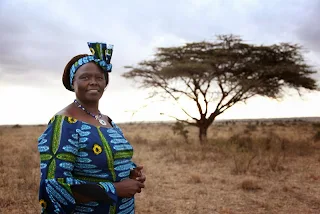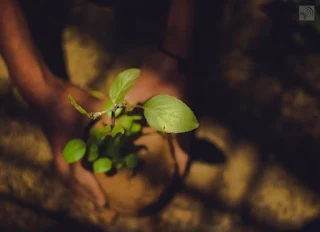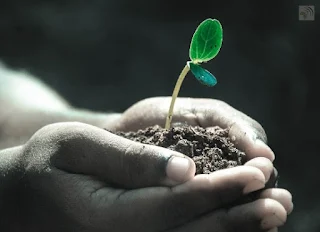Dr. Wangari Maathai Green Belt Movement
Kenya's Dr. Wangari Maathai was the first African women to receive the Nobel Peace Prize. Dr. Maathai was awarded the 2004 Nobel Peace Prize in the field of humanitarian work founding The Green Belt Movement.
The Green Belt Movement or GBM was founded by Professor Wangari Maathai in 1977. The GBM was created to respond to the needs of rural Kenyan women who reported that their streams were drying up, their food supply was less secure, and they had to walk further and further to get firewood for fuel and fencing. GBM encouraged the women to work together to grow seedlings and plant trees to bind the soil, store rainwater, provide food and firewood, and receive a small monetary token for their work.
Professor Maathai saw that behind the everyday hardships of the poor, environmental degradation, deforestation, and food insecurity were deeper issues of disempowerment, disenfranchisement, and a loss of the traditional values that had previously enabled communities to protect their environment, work together for mutual benefit, and to do both selflessly and honestly.
The GBM instituted seminars in civic and environmental education to encourage individuals to study why they lacked the organization to change their political, economic, and environmental circumstances. Members began to understand that for years they had been placing their trust in leaders who had betrayed them and that they were sabotaging their lives by not working for the common good and failing to use their natural resources wisely.
The Green Belt Movement began to advocate for greater democratic space and more accountability from national leaders. It fought against land grabbing and the encroachment of agriculture into the forests. It contested the placement of a tower block in Uhuru Park in downtown Nairobi and joined others to call for the release of political prisoners.
In recent years, it has extended its reach internationally to campaign and advocate on climate change and the importance of Africa’s rainforests in the Congo. Maathai was appointed Goodwill Ambassador for the Congo Basin Forest Ecosystem, the world’s second lung after the Amazon Rainforest.
The work of Professor Maathai and the Green Belt Movement continues to stand as a testament to the power of grassroots organizing, proof that one person’s simple idea—that a community should come together to plant trees, can make a difference.
Her legacy truly lives on through the Movement which to date remains in the frontline of advocating for environmental conservation in Kenya and making great progress on reclaiming and restoring forestland. The Green Belt Movement works with rural communities to help them address their needs for essential basic services such as water, fertile soil, and a healthy ecosystem through planting trees on critical watersheds.
 |
| Dr. Wangari Maathai |
Links to more valuable information
Read more about women on the African continent.The Black Natural and Weaved Hair That Divides Us
Emotional Impact of Infertility
Why People Are Given A Name African Folklore
Genes are speaking, ethnically and genetically diverse Africans
Accept Your Body African Proverbs

 Since 2007
Since 2007




